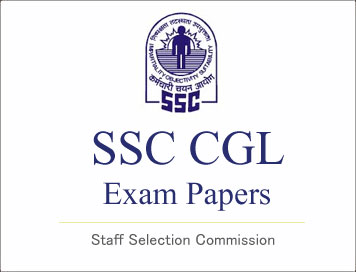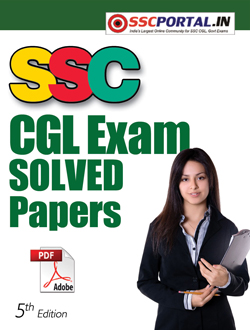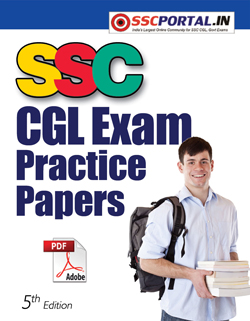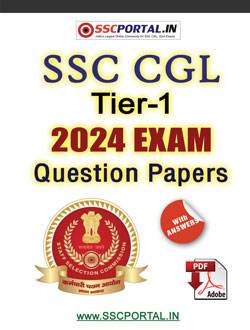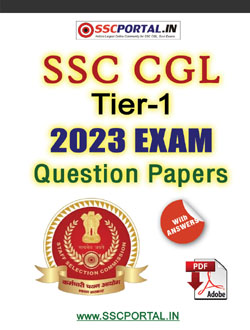NEW! SSC CGL PDF NOTES
SSC CGL (Tier - 1) Previous Year Solved Paper - 2010 "English Comprehesion"
SSC CGL (Tier - 1) Previous Year Solved Paper - 2010
Subject: English Comprehesion
Directions (1-5): In the following questions, some of the sentences have errors and some have none. Find out which part of a sentence has an error. The number of that part is your answer. Your answer is (d) i.e., No error.
1. He is a university professor (a)/ but of his three sons (b)/ neither has any merit. (c)/ No error (d).
2. After knowing truth,(a)/ they took the right decision (b)/ in the matter. (c)/ No error (d).
3. It is time you (a)/ decide on your next (b)/ course of action. (c)/ No error (d).
4. He who has suffered most (a)/ for the cause, (b)/ let him speak (c)/ No error (d).
5. A cup of coffee (a)/ is an excellent complement (b)/ to smoked salmon. (c)/ No error (d).
Directions (6-10): Sentences are given with blanks to be filled in with an appropriate word(s). Four alternatives are suggested for each question. Choose the correct alternative out of the four.
6. The hotel was not too expensive
(a) was it ?
(b) wasn’t it?
(c) is it ?
(d) isn’t it ?
7. Like humans, zoo animals must have a dentist their teeth
(a) fill
(b) filled
(c) filling
(d) to be filled
8. It was very kind of you to do the washing-up, but you _ it.
(a) didn’t have to do
(b) hadn’t to do
(c) mightn’t have done
(d) mustn’t have done
9. He went sea alone.
(a) in
(b) to
(c) into
(d) on
10. The……of our civilization from an agricultural society to today’s complex industrial world was accompanied by war.
(a) adjustment
(b) migration
(c) route
(d) metamorphosis
Directions (161-165): In the following questions choose the word opposite in meaning to the given word.
11. FLORID
(a) Weak
(b) Pale
(c) Monotonous
(d) Ugly
12. VERITY
(a) Sanctity
(b) Reverence
(c) Falsehood
(d) Rarity
13. PERSPICUITY
(a) Vagueness
|(b) Dullness
(c) Unfairness
(d) Unwillingness
14. FERVENT
(a) Inexcitable
(b) Enduring
(c) Dispassionate
(d) Subdued
15. MEANDERING
(a) Sliding
(b) Sloping
(c) Strained
(d) Straight
Directions (16-20): In the following questions out of the four alternatives, choose the one which best expresses the meaning of the given word.
16. LUXURIANT
(a) Luxury-loving
(b) Lovely
(c) Rich
(d) Abundant
17. CANTANKEROUS
(a) Cancerous
(b) Ferocious
(c) Quarrelsome
(d) Fissiparous
18. ONUS
(a) Sadness
(b) Happiness
(c) Responsibility
(d) Criticism
19. DERISION
(a) Humiliation
(b) Embarrassment
(c) Ridicule
(d) Condemnation
20. TRITE
(a) Commonplace
(b) Clever
(c) Brief
(d) Impudent
Directions (171-175): In the following questions a part of the sentence is bold. Below are given alternatives to the bold part at (a), (b) and (c) which may improve the sentence. Choose the correct alternative. In case no improvement is needed, your answer is (d).
21. Obviously he isn’t cut up to be. good teacher.
(a) cut out
(b) cut in
(c) cut for
(d) No improvement
22. Power got with money is the most craved for today.
(a) sought after
(b) wished for
(c) welcomed for
(d) No improvement
23. The brown shirt wants washing.
(a) has to wash
(b) is in need of a wash
(c) requires awash
(d) No improvement
24. You are asked to copy this letter word by word.
(a) word for word
(b) word with word
(c) word to word
(d) No improvement
25. The weak man is a slave to his sensuous pleasures.
(a) sensory
(b) sensual
(c) secondary
(d) No improvement
SSC CGL Tier-1 Previous Year Solved Papers Online Tests Series
Directions (26-30): In the following questions, out of the four alternatives, choose the one which can be substituted for the given words/sentence.
26. An underhand device resorted to in order to justify misconduct
(a) Subterfuge
(b) Manoeuvre
(c) Stratagem
(d) Complicity
27. Impossible to describe
(a) Miraculous
(b) Ineffable
(c) Stupendous
(d) Appalling
28. One who criticises popular beliefs which he thinks is mistaken or unwise
(a) Philistine
(b) Iconoclast
(c) Imposter
(d) Cannibal
29. Detaining and confining someone
(a) Interruption
(b) Interrogation
(c) Interment
(d) Internment
30. Science of the races of mankind
(a) Genealogy
(b) Epistemology
(c) Ethnology
(d) Sociology
Directions (31-35): In the following questions, groups of four words are given. In each group, one word is correctly spelt. Find the correctly spelt word.
31.
(a) collaborate
(b) comemorate
(c) colate
(d) chocolate
32.
(a) circuiteous
|(b) clairvoyant
(c) chivelery
(d) cavalcade
33.
(a) severety
(b) sovereignity
(c) superiorty
(d) serenity
34.
(a) cummulative
(b) comemmorative
(c) accummulative
(d) accommodative
35.
(a) benidiction
(b) besmerch
(c) beneficient
(d) benevolence
Directions (36-40): In the following questions, the 1 stand the last sentences of the passage are numbered 1 and 6. The rest of the passage is split into four parts and named P, Q, R and S. These four parts are not given in their proper order. Read the sentence and find out which of the four combinations is correct. Then find the correct answer.
36. 1. Education in India had a glorious beginning. P. But after the British rule, it faced many changes.
Q. It went on for centuries with the same glory. R. English as the medium of instruction had a very great response.
S. One of the changes was the introduction of English as the medium of instruction.
6. As the Britishers left we had a complexity of opinions regarding English
(a) PQRS
(b) QPSR
(c) PQSR
(d) SRPQ
37. 1. It is easy to criticize the people at the helm, for the slow progress in every field.
P. We are well aware that the intellectuals are leaving our country for better employment opportunities.
Q. Then question remains unanswered because our country cannot show opportunities to the intellectuals.
R. Then, what about their obligation to the Motherland ?
S. First, we should ask ourselves as to what is happening to the young intellectuals in India. 6. This situation of ‘Brain-Drain leads to a variety of problems.
(a) PSQR
(b) RPSQ
(c) PSRQ
(d) SPRQ
38. 1. It is the responsibility of parents to teach the young moral values in life.
P. Many children take advantage of their parents’ busy schedule.
Q. This results in children’s ignorance of social values.
R. The reason behind it is that parents are quite busy nowadays.
S. Nowadays parents spend very meagre time with children.
6. As such, the society is going away from the value system.
(a) SRPQ
(b) PQRS
(c) SQRP
(d) SPQR
39. 1. The man who does his duty without any selfish desire for fruit may be called a sanyasi as well as yogi.
P. The man who has achieved much evenness of temper will be serene, because his mere thoughts are changed with the strength of action.
Q. He would practise yoga, i.e., evenness of temper, and cannot but perform action.
R. The root of the matter is that one should not allow his mind to flit from object of desire to another and from that to a third.
S. But he who abstains from action altogether is only an idler.
6. A yogi is one who is not attached to his objects of sense or to action and whose mind has ceased to roam restlessly.
(a) SRQP
(b) RQPS
(c) QRSP
(d) PRSQ
40. 1. This was an important day for at took.
P. It was a cold day, but Alatook would be warm.
Q. For the first time he was going to hunt seals alone.
R. First he put on his fur-lined jacket.
S. Then he put on mittens and boots of deerskin to protect his hands and feet from the cold. 6. Finally he picked up the gun he had cleaned so carefully the day before.
(a) PQRS
(b) QPRS
(c) PRSQ
(d) QRPS
Directions (41-45): In the following questions, a sentence has been given in Active Voice/Passive Voice, Out of the four alternatives suggested, select the one which best expresses the same sentence in Passive/ Active Voice.
41. They have made a film based on this novel.
(a) A film was based on. this novel and made.
(b) A film have been made based . on, this novel.
(c) A film, based on this novel, has been made
(d) A film has been based and made on this novel.
42. The people couldn’t move me to the hospital and the doctor operated on me at home.
(a) I couldn’t be moved to the hospital and was operated on at home by the doctor.
(b) I couldn’t be moved to the hospital and I had to be operated on at home.
(c) I couldn’t be moved to the hospital and I was operated at home by the doctor.
(d) I couldn’t be moved to the hospital by the people and operated on at home.
43. Why did he deprive you of the membership ?
(a) Why you were deprived of the membership?
(b) Why were you deprived of his membership by him ?
(c) Why was he deprived of his membership
(d) Why were you deprived of your membership by him ?
44. The news has been brought to us by him.
(a) He brought us the news.
(b) He has brought us the news.
(c) He was brought the news to us.
(d) We brought the news to him.
45. Not a word was spoken by the criminal in self-defence.
(a) The criminal spoke not a word in self-defence.
(b) The criminal in self-defence spoke no word.
(c) The criminal did not speak a word in self-defence.
(d) The criminal spoke in selfdefence not a word.
Directions (46-50): In the following passage, you have one brief passage with 5 questions following the passage. Read the passage carefully and choose the best answer to each question out of the four alternatives.
PASSAGE
Every profession or, trade, every art and every science has its technical vocabulary, the function of which is partly to designate things or processes which have no names in ordinary English and partly to secure greater exactness in nomenclature. Such special dialects or jargons are necessary in technical discussion of any kind. Being universally understood by the devotees of the particular science or art, they have the precision of a mathematical formula. Besides, they save time, for it is much more economical to name a process than to describe it. Thousands of these technical terms are very properly included in every large dictionary, yet, as a whole, they are rather on the outskirts of the English language than actually within its borders. Different occupations, however, differ widely in the character of their special vocabularies. In trades and handicrafts and other vocations like farming and fishing that have occupied great numbers of men from remote times, the technical vocabulary is very old. An average man now uses these in his own vocabulary. The special dialects of law, medicine, divinity and philosophy have become familiar to cultivated persons.
46. Special words used in technical discussion
(a) may become part of common speech
(b) never last long
(c) should resemble mathematical formula
(d) should be confined to scientific fields
47. The writer of this article is
(a) a scientist
(b) a politician
(c) a linguist
(d) a businessman
48. This passage is primarily concerned with
(a) various occupations and professions
(b) technical terminology
(c) scientific undertakings
(d) a new language
49. It is true that
(a) various professions and occupations often interchange words
(b) there is always a non-technical word that may be substituted for the technical word
(c) the average man often uses in his own vocabulary what was once technical language not meant for him
(d) everyone is interested in scientific findings
50. In recent years, there has been a marked increase in the number of technical terms in the nomenclature of
(a) Farming
(b) Fishing
(c) Sports
(d) Government
Answer Key
| 1.c | 6.a | 11.b | 16.d | 21.a | 26.b | 31.a | 36.b | 41c | 46.c |
| 2.a | 7.a | 12.c | 17.c | 22.d | 27.b | 32.b | 37.d | 42.a | 47.c |
| 3.b | 8.d | 13.a | 18.c | 23.c | 28.b | 33.d | 38.a | 43.d | 48.b |
| 4.c | 9.b | 14.c | 19.c | 24.a | 29.d | 34.d | 39.a | 44.b | 49.c |
| 5.d | 10.d | 15.d | 20.a | 25.b | 30.c | 35.d | 40.b | 45.c | 50.d |
Crash Course for SSC CGL (Tier-1) Exam
Study Materials for SSC CGL EXAM
SSC CGL Tier-1 Previous Year Solved Papers Online Tests Series


